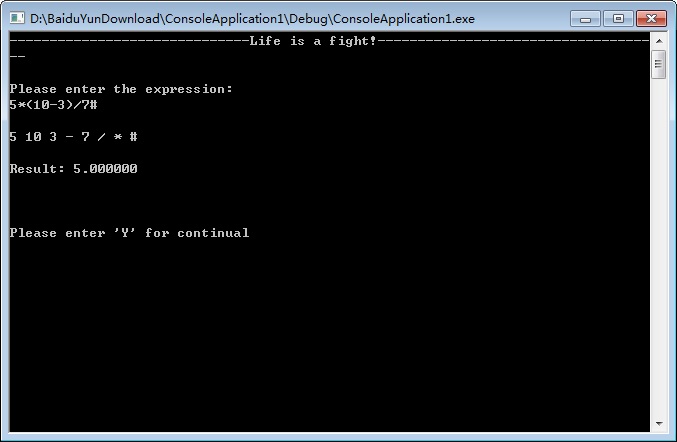【C语言】表达式求值问题,应用“栈”编写一个计算器
【C语言】表达式求值问题,应用“栈”编写一个计算器,要求:
a)支持整数(长整型范围内)四则混合运算;
b)输入应是中缀表达式,对不合法的输入应有提示;
c)能够输出正确计算结果;
d)示例如输入5*(10-3)/7 ,输出结果5
我有现成程序,你试试:
#include<ctype.h>
#include<stdlib.h>
#define stacksize 30
#define stackincrease 30
#define maxvalume 30
#define expvalume 200
#define title "------------------------------Life is a fight!------------------------------------"
typedef float Elemtype;
typedef struct STACK{
Elemtype* top;
Elemtype* base;
int len;
} stack;
stack* InitStack()
{
Elemtype* t;
stack* s;
t = (Elemtype*)malloc(stacksize*sizeof(Elemtype));
s = (stack*)malloc(sizeof(stack));
s->top = t;
s->base = t;
s->len = stacksize;
return s;
}
void PushStack(stack *s, Elemtype d)
{
if (s->top - s->base >= s->len - 1)
s->base = (Elemtype*)realloc(s->base, (s->len + stackincrease)*sizeof(Elemtype));
*s->top = d;
s->top++;
}
void PopStack(stack* s, Elemtype* d)
{
if (s->top == s->base)
{
printf("\nErr!\n");
return;
}
*d = *--(s->top);
}
int LengthStack(stack *s)
{
return (s->top - s->base);
}
int GetExp(Elemtype* str)
{
char c;
int i = 0;
fflush(stdin);
scanf("%c", &c);
while (c != '\n')
{
if (i > expvalume)
{
printf("Err: The expression is too long!\n");
return -1;
}
*str++ = c;
i++;
scanf("%c", &c);
}
if (i == 0)
{
*str++ = '#';
}
*str = '\0';
return i;
}
void NiftoSuf(Elemtype* nif, Elemtype* suf)
{
int i, j, n;
Elemtype c, t;
stack *s;
i = 0;
j = 0;
s = InitStack();
c = nif[i];
while (c != '#')
{
while (isdigit(c) || c == '.')
{
suf[j++] = c;
c = (char)nif[++i];
if ((c<'0' || c>'9') && c != '.')
{
suf[j++] = ' ';
}
suf[j] = '\0';
}
if (c == ')')
{
PopStack(s, &t);
while (t != '(')
{
suf[j++] = t;
suf[j++] = ' ';
PopStack(s, &t);
}
suf[j] = '\0';
}
else if (c == '(')
PushStack(s, c);
else if (c == '+' || c == '-')
{
if (!LengthStack(s))
{
PushStack(s, c);
}
else
{
do{
PopStack(s, &t);
if (t == '(')
{
PushStack(s, t);
}
else
{
suf[j++] = t;
suf[j++] = ' ';
suf[j] = '\0';
}
} while (LengthStack(s) && t != '('&&c != '(');
PushStack(s, c);
}
}
else if (c == '*' || c == '/' || c == '(')
{
PushStack(s, c);
}
else if (c == '#')
{
while (LengthStack(s))
{
PopStack(s, &t);
suf[j++] = t;
suf[j++] = ' ';
}
break;
}
else
{
printf("\nErr:Expression Error\n");
return;
}
i++;
c = nif[i];
}
if (c == '#')
while (LengthStack(s))
{
PopStack(s, &t);
suf[j++] = t;
suf[j++] = ' ';
}
suf[j++] = '#';
suf[j] = '\0';
free(s);
}
Elemtype Cal(Elemtype* suf)
{
int i, j;
char c;
Elemtype f, r, d1, d2;
stack *s;
i = 0;
j = 0;
s = InitStack();
char t[maxvalume];
c = suf[j++];
while (c != '#')
{
while (isdigit(c) || c == '.')
{
if (i > maxvalume)
{
printf("Err: The data is too large!\n");
return -1;
}
t[i++] = c;
t[i] = '\0';
c = suf[j++];
if (c == ' ')
{
f = atof(t);
PushStack(s, f);
i = 0;
}
}
switch (c){
case '+':
PopStack(s, &d2);
PopStack(s, &d1);
PushStack(s, d1 + d2);
break;
case '-':
PopStack(s, &d2);
PopStack(s, &d1);
PushStack(s, d1 - d2);
break;
case '*':
PopStack(s, &d2);
PopStack(s, &d1);
PushStack(s, d1*d2);
break;
case '/':
PopStack(s, &d2);
if (d2 == 0)
{
printf("Err: data error!\n");
return -1;
}
PopStack(s, &d1);
PushStack(s, d1 / d2);
break;
}
c = suf[j++];
}
PopStack(s, &r);
printf("Result: %f", r);
free(s);
return r;
}
int main(void)
{
int i, j, k;
char c, c1, y;
Elemtype nif[expvalume], suf[expvalume];
printf("%s\n\n", title);
do{
i = 0;
j = 0;
k = 0;
printf("Please enter the expression:\n");
GetExp(nif);
NiftoSuf(nif, suf);
printf("\n");
while (suf[k] != '\0')
{
c1 = suf[k];
printf("%c", c1);
k++;
}
printf("\n\n");
Cal(suf);
printf("\n\n\n");
printf("\nPlease enter 'Y' for continual\n");
scanf("%c", &y);
printf("\n");
fflush(stdin);
} while (y == 'Y' || y == 'y');
return 0;
}
运行效果如下,输入算式后用#做结尾:
把算式错误判断部分完善了一下:
#include<ctype.h>
#include<stdlib.h>
#define stacksize 30
#define stackincrease 30
#define maxvalume 30
#define expvalume 200
#define title "------------------------------Life is a fight!------------------------------------"
typedef float Elemtype;
typedef struct STACK{
Elemtype* top;
Elemtype* base;
int len;
} stack;
stack* InitStack()
{
Elemtype* t;
stack* s;
t = (Elemtype*)malloc(stacksize*sizeof(Elemtype));
s = (stack*)malloc(sizeof(stack));
s->top = t;
s->base = t;
s->len = stacksize;
return s;
}
void PushStack(stack *s, Elemtype d)
{
if (s->top - s->base >= s->len - 1)
s->base = (Elemtype*)realloc(s->base, (s->len + stackincrease)*sizeof(Elemtype));
*s->top = d;
s->top++;
}
void PopStack(stack* s, Elemtype* d)
{
if (s->top == s->base)
{
printf("\nErr!\n");
return;
}
*d = *--(s->top);
}
int LengthStack(stack *s)
{
return (s->top - s->base);
}
int GetExp(Elemtype* str)
{
char c;
int i = 0;
fflush(stdin);
scanf("%c", &c);
while (c != '\n')
{
if (i > expvalume)
{
printf("Err: The expression is too long!\n");
return -1;
}
*str++ = c;
i++;
scanf("%c", &c);
}
if (i == 0)
{
*str++ = '#';
}
*str = '\0';
return i;
}
int NiftoSuf(Elemtype* nif, Elemtype* suf)
{
int i, j, n;
Elemtype c, t;
stack *s;
i = 0;
j = 0;
s = InitStack();
c = nif[i];
while (c != '#')
{
while (isdigit(c) || c == '.')
{
suf[j++] = c;
c = (char)nif[++i];
if ((c<'0' || c>'9') && c != '.')
{
suf[j++] = ' ';
}
suf[j] = '\0';
}
if (c == ')')
{
PopStack(s, &t);
while (t != '(')
{
suf[j++] = t;
suf[j++] = ' ';
PopStack(s, &t);
}
suf[j] = '\0';
}
else if (c == '(')
PushStack(s, c);
else if (c == '+' || c == '-')
{
if (!LengthStack(s))
{
PushStack(s, c);
}
else
{
do{
PopStack(s, &t);
if (t == '(')
{
PushStack(s, t);
}
else
{
suf[j++] = t;
suf[j++] = ' ';
suf[j] = '\0';
}
} while (LengthStack(s) && t != '('&&c != '(');
PushStack(s, c);
}
}
else if (c == '*' || c == '/' || c == '(')
{
PushStack(s, c);
}
else if (c == '#')
{
while (LengthStack(s))
{
PopStack(s, &t);
suf[j++] = t;
suf[j++] = ' ';
}
break;
}
else
{
printf("\nErr:Expression Error\n");
return -1;
}
i++;
c = nif[i];
}
if (c == '#')
while (LengthStack(s))
{
PopStack(s, &t);
suf[j++] = t;
suf[j++] = ' ';
}
suf[j++] = '#';
suf[j] = '\0';
free(s);
return 0;
}
Elemtype Cal(Elemtype* suf)
{
int i, j;
char c;
Elemtype f, r, d1, d2;
stack *s;
i = 0;
j = 0;
s = InitStack();
char t[maxvalume];
c = suf[j++];
while (c != '#')
{
while (isdigit(c) || c == '.')
{
if (i > maxvalume)
{
printf("Err: The data is too large!\n");
return -1;
}
t[i++] = c;
t[i] = '\0';
c = suf[j++];
if (c == ' ')
{
f = atof(t);
PushStack(s, f);
i = 0;
}
}
switch (c){
case '+':
PopStack(s, &d2);
PopStack(s, &d1);
PushStack(s, d1 + d2);
break;
case '-':
PopStack(s, &d2);
PopStack(s, &d1);
PushStack(s, d1 - d2);
break;
case '*':
PopStack(s, &d2);
PopStack(s, &d1);
PushStack(s, d1*d2);
break;
case '/':
PopStack(s, &d2);
if (d2 == 0)
{
printf("Err: data error!\n");
return -1;
}
PopStack(s, &d1);
PushStack(s, d1 / d2);
break;
}
c = suf[j++];
}
PopStack(s, &r);
printf("Result: %f", r);
free(s);
return r;
}
int main(void)
{
int i, j, k;
char c, c1, y;
Elemtype nif[expvalume], suf[expvalume];
printf("%s\n\n", title);
do{
i = 0;
j = 0;
k = 0;
printf("Please enter the expression:\n");
GetExp(nif);
int nRet = NiftoSuf(nif, suf);
if (nRet == -1) break;
printf("\n");
while (suf[k] != '\0')
{
c1 = suf[k];
printf("%c", c1);
k++;
}
printf("\n\n");
Cal(suf);
printf("\n\n\n");
printf("\nPlease enter 'Y' for continual\n");
scanf("%c", &y);
printf("\n");
fflush(stdin);
} while (y == 'Y' || y == 'y');
system("pause");
return 0;
}
头文件就这些,因为是试验程序,里面肯定有些没用到的:
#include <stdio.h>
#include <stdlib.h>
#include <string.h>
#include <iostream>
#include <math.h>
#include<iostream>
#include <iostream>
#include <stdio.h>
#include <math.h>
#include <iostream>
#include <cmath>
#include <iomanip>
#include <string>
#include<ctype.h>
using namespace std;
这个问题我回答过,看
https://ask.csdn.net/questions/677045
https://download.csdn.net/user/caozhy/uploads/20

https://download.csdn.net/download/caozhy/10191105 这里有完整的代码项目文件,到手即用,所见即所得。
采纳本回答,可以按照你的要求定制,另外送你1000个c语言例子+vc++源代码大全+mfc源代码。
https://download.csdn.net/download/caozhy/1899674
https://download.csdn.net/download/caozhy/9918664
https://download.csdn.net/download/caozhy/9918723
以上资源均为本人上传,可放心。